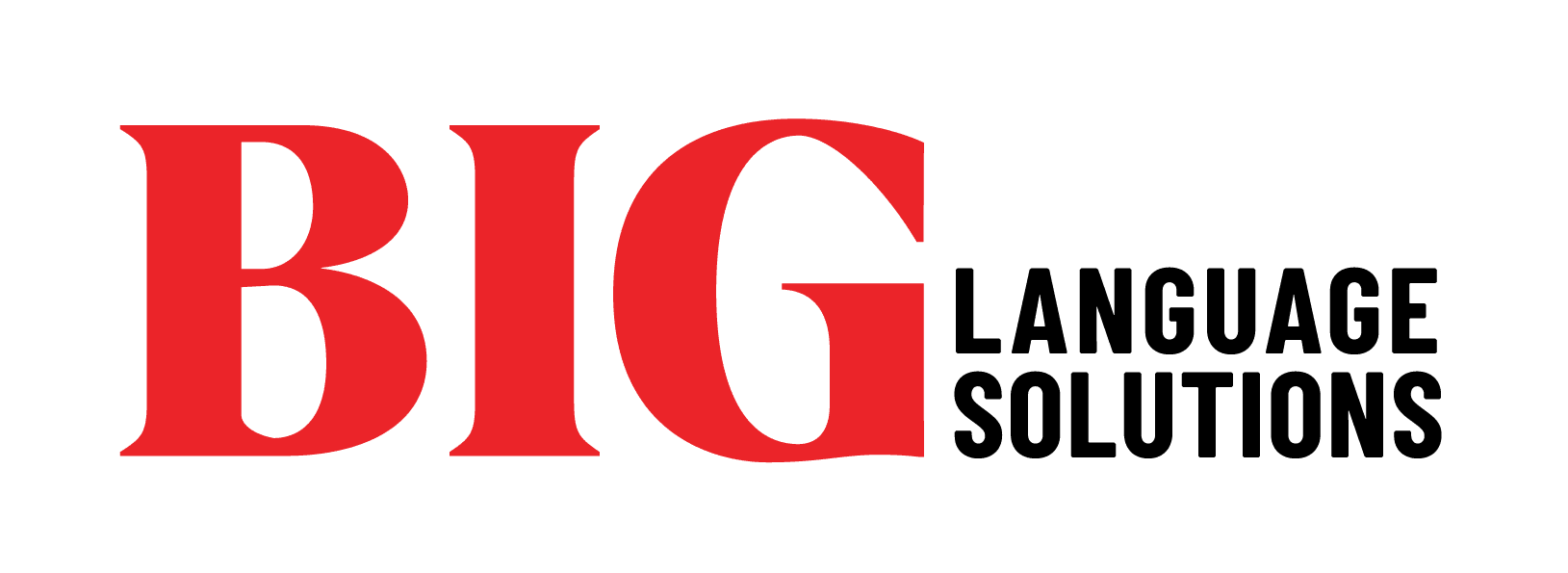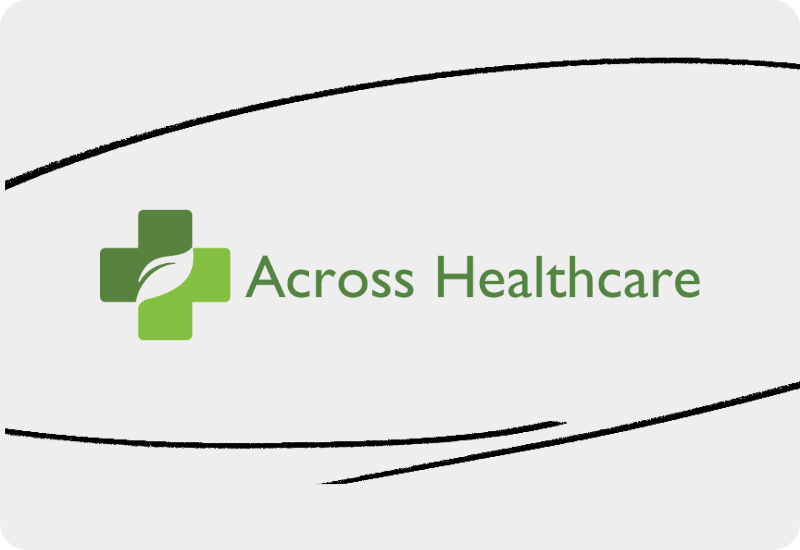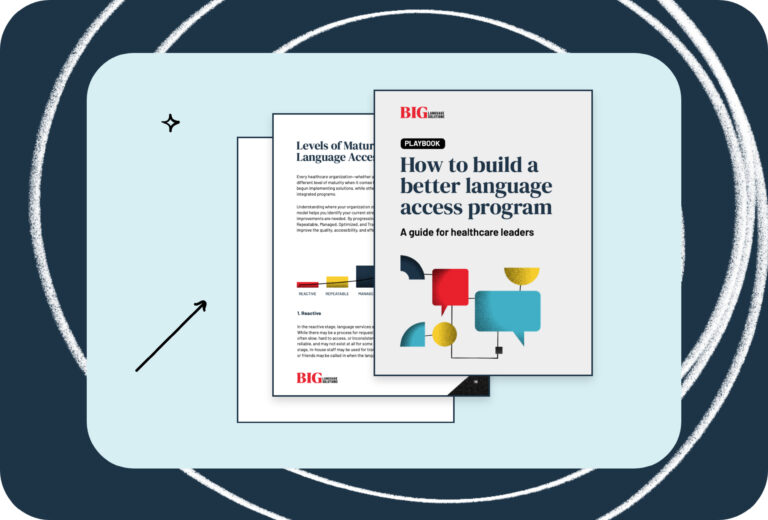1 in 5 Americans speak a language other than English at home—which means they may not understand critical healthcare conversations if those conversations are in English. How confident would you feel about a patient’s safety or the effectiveness of their care if they didn’t fully understand their diagnosis or treatment plan?
Overcoming these communication barriers is crucial to providing high-quality care. That’s where companies offering professional language services to support language access are indispensable. So, what exactly do these companies do—and how can they help provide better care to patients with limited English proficiency (LEP)?
What are Language Services?
Companies providing language services help organizations provide equal language access to services for people with limited English proficiency (LEP) or who need alternate formats like Braille.
These are highly specialized services that help healthcare organizations communicate with patients who have limited English proficiency (LEP). This can include:
- Interpretation: Real-time communication is supported through over-the-phone (OPI), video remote (VRI), or in-person interpretation in hundreds of languages. HIPAA-compliant platforms are used during everything from emergency room visits to telehealth appointments, providing secure, immediate access to interpreters when patients need them most.
- Translation: Key documents like consent forms, discharge instructions, and medical records are translated by healthcare-specialized linguists. Translations are adapted to reflect local dialects and cultural differences, which is especially important when translating sensitive materials like mental health questionnaires, where subtle differences in language can affect patient understanding.
- Alternate formats: Some patients need written information in alternate formats, like Braille, large print, or audio. Some patients may need both alternate formats and translation services. A full-service language services company can provide all of this.
Some service providers, like BIG Language Solutions, also provide workflow management tools that help streamline this work, and document printing and mailing to LEP community members and customers.
This suite of services equips healthcare organizations with the tools they need to address language barriers while maintaining patient confidentiality and meeting regulatory requirements.
Why Do Healthcare Organizations Need Support with Language Access Plan Deployment?
Many healthcare organizations, especially smaller clinics and community health organizations, try to manage language access plans in-house, along with all of their other responsibilities. Doing so can impact the patient experience for patients with LEP, as well as the quality of care they receive.
Partnering with a language access company provides the support needed to overcome these barriers, so all patients get the level of care they expect and deserve.
Here’s why working with a language access partner is essential in healthcare:
- Reduces the Risk of Miscommunication
Studies show that using professional medical interpreters significantly reduces the likelihood of mistakes and improves patient safety. For example, providing professional interpretation services to patients with LEP can slice medical error rates in half.By working with a language access company, healthcare organizations can connect with a network of qualified interpreters who understand medical terminology and can accurately convey critical information between patients and providers.
- Stay Compliant with Language Access Laws
Healthcare organizations are required by a variety of federal and state regulations, like Title VI of the Civil Rights Act and Section 1557 of the Affordable Care Act (ACA), to provide language services to patients with limited English proficiency (LEP).For many clinics and community health organizations, managing these legal requirements can be overwhelming. A language access company takes on this responsibility by providing professional interpreters and translators as needed.
- Protect Patient Privacy and Data
Healthcare providers must protect patient data under regulations like the Health Insurance Portability and Accountability Act (HIPAA). Anytime a third party handles sensitive patient information—like during interpretation or translation—privacy and security need to be maintained.A reliable language access company uses secure, HIPAA-compliant systems to safeguard protected health information (PHI). Whether it’s over-the-phone interpretation (OPI) or translating medical documents, these services make sure that patient confidentiality is always protected.
- Boost Patient Outcomes and Satisfaction
When patients get fast, reliable access to language services, they are more satisfied with their experience and are better able to manage their health. Research has shown that hospitals offering language access services tend to see higher patient satisfaction ratings and improved patient outcomes. - Reduce the Burden on Staff
Some organizations may rely on bilingual staff to interpret for patients with limited English proficiency. If there’s no one on duty who speaks the right language, they may move on to the patient’s family members (which is inappropriate and illegal especially when those interpreters are children). However, this approach often leads to inconsistent and inaccurate communication and puts extra pressure on staff who may not have the training to handle medical conversations properly or on family members who may struggle with sensitive conversations.By partnering with a language services company, healthcare providers can offload this responsibility to experienced, medical-certified interpreters, so staff can focus on their core responsibilities.
- Access to Technology and Scalable Solutions
One of the key advantages of working with a language services provider is the technology they offer. From OPI services with advanced features like smart call routing to automated workflows to manage translation requests, a language services provider helps your patients get services faster and more reliably than your organization could do on its own. BIG offers a tool called LanguageExpress™ that speeds up the translation of large volumes of healthcare documentation.
The Role of a Language Access Plan
Most healthcare organizations create language access plans to make sure language barriers don’t prevent people from accessing essential services. These plans outline how organizations will communicate with LEP individuals and comply with legal requirements.
These plans include guidelines on:
- The languages the organization needs to cover
- The touchpoints that require language access help (such as intake, discharge, consultations, etc)
- The language access services that are available and how to access them
- Training that the staff needs
- How success will be measured
Healthcare organizations rely on language access companies to put these plans into action. With their expertise, these companies help healthcare providers communicate clearly and meet compliance standards, making sure all patients can fully understand their care, no matter what language they speak.
How to Choose the Right Language Access Provider
Choosing the right language access provider can make all the difference in how effectively you communicate with your patients. Here’s what to look for when selecting a partner for your healthcare organization:
- Healthcare Expertise and Compliance
Healthcare communication needs more than just general language skills—it requires a deep understanding of medical terminology, strict compliance with complex regulations, and an understanding of language access and how to provide it. Look for a provider with proven experience in healthcare as well as healthcare-specific linguists with the training to translate or interpret complex medical terminology accurately.With over 40 years of expertise and a vast network of medical translators and interpreters, BIG Language Solutions is equipped to handle healthcare’s unique challenges.
- Speed and Availability
In healthcare, timing is everything. Your language access provider should be available 24/7/365, with rapid response times for both interpretation and translation. BIG’s LanguageExpress™ service delivers same-day translations, and our Over-the-Phone Interpretation (OPI) connects you to an interpreter in just 20 seconds, with 99.999% uptime. - Language Coverage for Diverse Populations
Your provider needs to cover all the languages your patients speak. With services in over 300 languages, BIG Language Solutions offers the support you need to reach any patient population. - Technology and Flexibility
Efficient, easy-to-use technology plays a huge role in managing your language needs. For example, our LanguageExpress™ platform uses automation to deliver significant time savings for translation requests, with quick fulfillment options, including same-day service if needed. We offer complete end-to-end service, including translation, print, and distribution.By choosing a provider with the right expertise, fast service, and a wide range of languages, you can give your patients communication in their preferred languages—exactly when they need it most.
Take the Guesswork Out of Language Access
In healthcare, your priority is delivering the best care possible, and providing language assistance is a huge part of that. However, coordinating multilingual services on your own can stretch your team too thin. Partnering with a professional language services provider gives you the tools and expertise needed to communicate clearly with all your patients—without overburdening your staff.
With round-the-clock availability, broad language coverage, and compliance with industry regulations, you’ll have peace of mind knowing your patients are receiving the care they need.
Ready to make language access easier for your team and better for your patients? Contact us today and discover how BIG Language Solutions can help you deliver clear communication and exceptional care to every patient.






